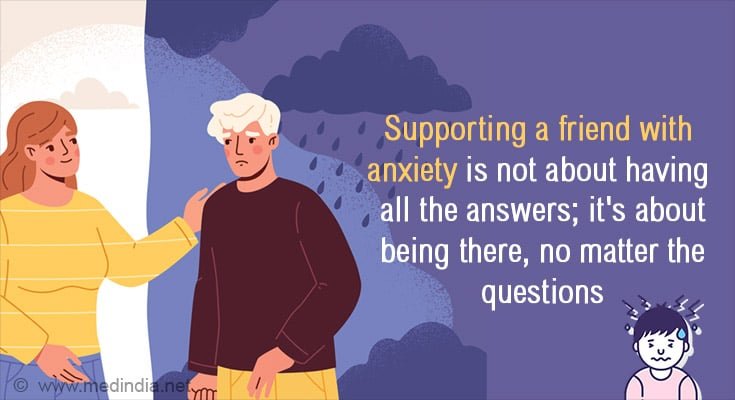How to Help an Anxious Person? What to Say and What to Avoid

, can become overwhelming for some individuals, affecting their daily lives. Have you often caught yourselves with a question of how to deal with an anxious loved one? Here are ways to navigate the feelings of powerlessness and be there for your friend.
Recognizing anxiety symptoms is crucial for effective communication. Dr. Parth Nagda, a psychiatrist, explains that anxiety involves persistent feelings of unease, fear, or worry, both mentally and physically.
Symptoms vary but may include increased heart rate, muscle tension, restlessness, sweating, trembling, sleep disturbances, irritability, overthinking, agitation, and difficulty focusing. Different anxiety disorders, such as generalized anxiety disorder, panic disorder, and social anxiety disorder, further complicate the picture.
Advertisement
It’s essential to differentiate anxiety from normal jitters. Jitters are brief and mild feelings of nervousness, often before specific events like public speaking or starting a new job. Anxiety, on the other hand, is a persistent mental health condition, marked by intense and prolonged worry, fear, or apprehension. Understanding this distinction is crucial when approaching someone with anxiety (2✔ ✔Trusted Source
How to Deal with Anxious People
Go to source
).
What Not to Say to Someone with Anxiety
Communicating with someone with anxiety requires sensitivity. Avoiding certain phrases can prevent unintentional harm. Here are ten things you should refrain from saying:
- Just unwind
- It’s all in your head
- Snap out of it
- What do you have to be anxious about?
- You are being too sensitive
- I know how you feel
- Why don’t you just face your fears?
- Calm down
- You are overreacting
- It’s all in God’s hands
What to Say to Someone with Anxiety
Consistent check-ins show that you care. A simple “How are you feeling today?” or a heartfelt text can make your friend feel less alone. Regular communication reinforces your commitment to their well-being.
Empathy, support, and understanding are key when communicating with someone experiencing anxiety. Here are positive phrases to use:
- I’m here for you
- Is there anything specific you’d like to talk about or share?
- I’m sorry you are going through this. How can I help?
- What do you need right now?
- I may not fully understand, but I want to learn more about how you are feeling
- Take your time; there is no rush
How to Support and Help a Friend Dealing with Anxiety
It’s okay to feel helpless. Recognize your emotions and understand that you can still offer valuable support even if you can’t fix everything. Acceptance is the first step in being a supportive friend. Create a safe space for your friend to express their thoughts and emotions without fear of judgment. Sometimes, all they need is someone who listens without offering immediate solutions.
Open a conversation with care by expressing your concern. Let your friend know you’ve noticed their struggles and that you genuinely want to be there for them. Your empathy can be a source of comfort. Offer assistance with daily tasks, accompany them to appointments, or suggest activities that promote relaxation (3✔ ✔Trusted Source
Seven Ways to Help Someone with Anxiety
Go to source).
Suggesting professional assistance is a supportive step. Gently recommend speaking to a therapist or counselor. Assure your friend that seeking help is a sign of strength, and offer assistance in finding suitable resources. Understanding that healing is a process, respect your friend’s pace. Be patient and let them guide the conversation and any potential actions. Offering support is about being there for them, no matter the timeline. Assure your friend that they’re not alone in their journey.
Be Sure to take Care of Yourself, Too
Supporting an anxious friend can be emotionally taxing. Don’t forget to prioritize your well-being. Establish healthy boundaries to ensure that you can provide sustained support without compromising your mental health.
Recognizing the uniqueness of each person’s experience with anxiety is crucial. Being open, supportive, and patient can make a significant difference.
“Empathy is the silent language of understanding. Let your support speak volumes for your friend dealing with anxiety”
References :
- How to Help Someone with Anxiety – (https://www.hopkinsmedicine.org/health/treatment-tests-and-therapies/how-to-help-someone-with-anxiety)
- How to Deal with Anxious People – (https://hbr.org/2008/03/how-to-deal-with-anxious-peopl)
- Seven Ways to Help Someone with Anxiety – (https://greatergood.berkeley.edu/article/item/seven_ways_to_help_someone_with_anxiety)
Source: Medindia
Source link
#Anxious #Person #Avoid



